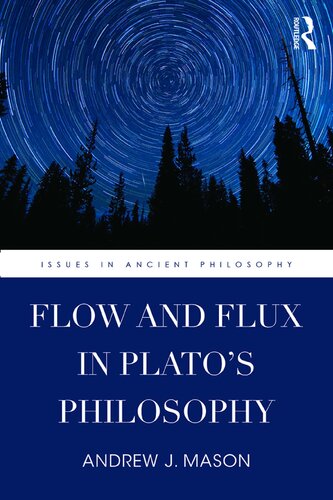

Most ebook files are in PDF format, so you can easily read them using various software such as Foxit Reader or directly on the Google Chrome browser.
Some ebook files are released by publishers in other formats such as .awz, .mobi, .epub, .fb2, etc. You may need to install specific software to read these formats on mobile/PC, such as Calibre.
Please read the tutorial at this link: https://ebookbell.com/faq
We offer FREE conversion to the popular formats you request; however, this may take some time. Therefore, right after payment, please email us, and we will try to provide the service as quickly as possible.
For some exceptional file formats or broken links (if any), please refrain from opening any disputes. Instead, email us first, and we will try to assist within a maximum of 6 hours.
EbookBell Team

0.0
0 reviewsIn this bold new study, Andrew J. Mason seeks both to shed light on the key issue of flux in Plato’s work, and to show that there is also in Plato a notion of flow that needs to be distinguished from flux. Mason brings out the importance of this hitherto neglected distinction, and proposes on its basis a new way of understanding the development of Plato’s thought.
The opposition between the ‘being’ of Forms and the ‘becoming’ or ‘flux’ of sensibles has been fundamental to the understanding of Plato from Aristotle to the present day. One key concern of this volume is to clarify which kinds or levels of flux Plato accepts in sensibles. In addition, Mason argues that this traditional approach is unsatisfactory, as it leaves out the important notion of flow. Unlike flux, flow is a kind of motion that does not entail intrinsic change. It is also not restricted to the sensible, but covers motions of soul as well, including the circular motion of nous (intelligence) that is crucial in Plato’s later thought, particularly his cosmology. In short, flow is not incompatible with ‘being’, and in this study Plato’s development is presented, largely, as his arrival at this view, in correction of his earlier conflation of flux and flow in establishing the dichotomy between being and becoming.
Mason’s study offers fresh insights into many dialogues and difficult passages in Plato’s oeuvre, and situates Plato’s conception and usage of ‘flow’ and ‘flux’ in relation to earlier usage in the Greek poetic tradition and the Presocratic thinkers, particularly Heraclitus. The first study of its kind, Flow and Flux uncovers dimensions of Plato’s thinking that may reshape the way his philosophy is understood.